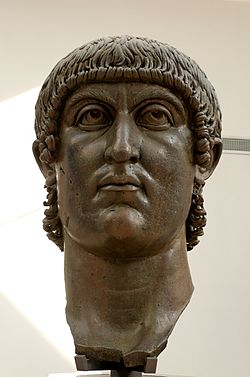Battle of Cibalae
| Battle of Cibalae | |||||||
|---|---|---|---|---|---|---|---|
| Part of Wars of Constantine I | |||||||
 Constantine, bronze head from a sculpture, Capitoline Museums, Rome |
|||||||
|
|||||||
| Belligerents | |||||||
| Constantine I | Licinius | ||||||
| Commanders and leaders | |||||||
| Constantine | Licinius | ||||||
| Strength | |||||||
| 20,000 | 35,000 | ||||||
| Casualties and losses | |||||||
| Unknown | 20,000 | ||||||
The Battle of Cibalae was fought on October 8, 314 (or perhaps as late as 316, the chronology is uncertain), between the two Roman emperors Constantine I and Licinius. The site of the battle was approximately 350 kilometers within the territory of Licinius. Constantine won a resounding victory, despite being outnumbered.
The hostilities were prompted by Constantine's appointment of his brother-in-law, Bassianus, as his Caesar. Bassianus was discovered to be intriguing against Constantine, perhaps at the prodding of his own brother Senecio, a close associate of Licinius. When Constantine demanded that Licinius hand over Senecio, Licinius refused. Constantine marched against Licinius, who responded by elevating another associate, Valens. The date of Valens' elevation as emperor probably occurred after the Battle of Cibalae.
The opposing armies met on the plain between the rivers Save and Drave near the town of Cibalae (now Vinkovci, Croatia). The battle lasted all day. Following a period of skirmishing and missile fire at a distance the main bodies of the armies met in close combat. A fierce hand-to-hand fight ensued. This battle of attrition was ended, late in the day, when Constantine personally led a cavalry charge from the right wing of his army. The charge was decisive, Licinius' ranks were broken. As many as 20,000 of Licinius' troops were killed in the hard-fought battle. The surviving cavalry of the defeated army accompanied Licinius when he fled the field under the cover of darkness.
Following the battle Licinius was forced to flee to Sirmium, and then, after collecting his family and treasury, to Thrace. Peace negotiations were initiated, but they broke down. A further battle was then fought, the Battle of Mardia, which proved to be indecisive. Heavy losses were suffered by both sides. Following the battle, in expectation of Licinius retreating on Byzantium, Constantine advanced in the direction of this city. However, Licinius had withdrawn northwards and this placed him across Constantine's lines of communication, Constantine also lost much of his baggage to Licinius. A treaty highly-favorable to Constantine was subsequently negotiated; this included the ceding by Licinius of the greater part of the Balkan Peninsula and the elevation of Constantine's sons, Crispus (then about 14) and Constantine (who was only an infant), with Licinius' young son (Licinius the Younger), to the rank of Caesar. Licinius then deposed and executed his erstwhile co-emperor Valens.
...
Wikipedia
